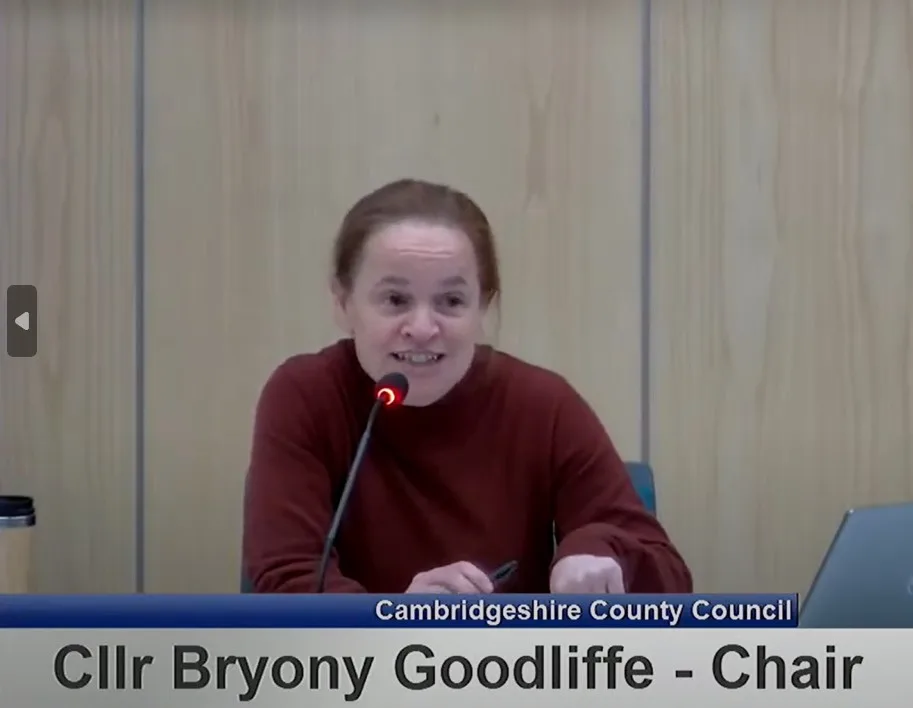Most define community as “a group of people with a common characteristic or interest living together within a larger society” but in a Cambridgeshire village that concept has been turned on its head.
And it is supposed community-led housing, which in Wilburton has been anything but, that has caused the rift and prompted a protracted, ongoing, and challenging investigation by Cambridgeshire and Peterborough Combined Authority (CAPCA).
Not only is reputational damage at stake but the fate of a convoluted application for 115 homes on a 45-acre site known as Camps Field which, when applied for over three years ago, offered 35 houses to be owned and administered by a community land trust.
Those 35 homes would be available for local people at affordable rents and would be built and paid for through the planning gain on the field, south of Stretham Road, Wilburton, with the developers using the market price homes to cross subsidise the community land trust homes.
The application to East Cambridgeshire District Council was made by the Stretham & Wilburton Community Land Trust and Laragh House Developments Ltd, the latter having already made its mark on Stretham with its Manor Farm estate.
“The CLT aims to promote and support economic and social life in the two parishes by developing property assets that generate income to be reinvested back into the local community,” was a pivotal and, at first glance, convincing statement in the application.
The CLT advocates included the parish council, East Cambridgeshire District Council and of course, then Mayor James Palmer and his erstwhile housing adviser and former council colleague Charles Roberts.
Mr Roberts also happened to be a Stretham resident and from the start took on the chairmanship of the joint village’s CLT and through his early work as a district and parish councillor, later as leader of East Cambridgeshire Council and then as a part time £54,000 housing adviser to Mayor Palmer, strode the provincial local government stage.
He believed wholeheartedly in the CLT model, in 2018 invited Housing Minister Kit Malthouse to Stretham to see it in action, and the world looked to be his oyster.

Charles Roberts (right) tweeted back in 2018 that it “was a pleasure to show the Housing Minister Kit Malthouse (2nd right) around Stretham CLT earlier this week. He commented upon the fantastic design of the homes and the “entrepreneurial” approach taken by East Cambs Council”. With them is former Mayor James Palmer and former Cllr Tom Hunt, now MP for Ipswich.
But many villagers of Wilburton were never wholeheartedly convinced of the merits of increasing the village housing stock by over 20% on an open field and well outside the village envelope, questions began to be asked, motives for the advancement of the CLT model earnestly considered, and so began a mission to effectively to derail it.
Not because CLTs of themselves were considered a bad thing, but the scale, machinations, and seemingly ruthless pursuit of this particular scheme in Wilburton rang alarm bells.
As word spread, villagers rallied and one early letter to East Cambs planners – from April 2020 and signed by ‘members of the Wilburton community’ – set the tone of the battle to follow.
The villagers (East Cambs planners redacted the numbers) reminded the council of “widespread opposition” to the proposals since they had first been outlined two years earlier.
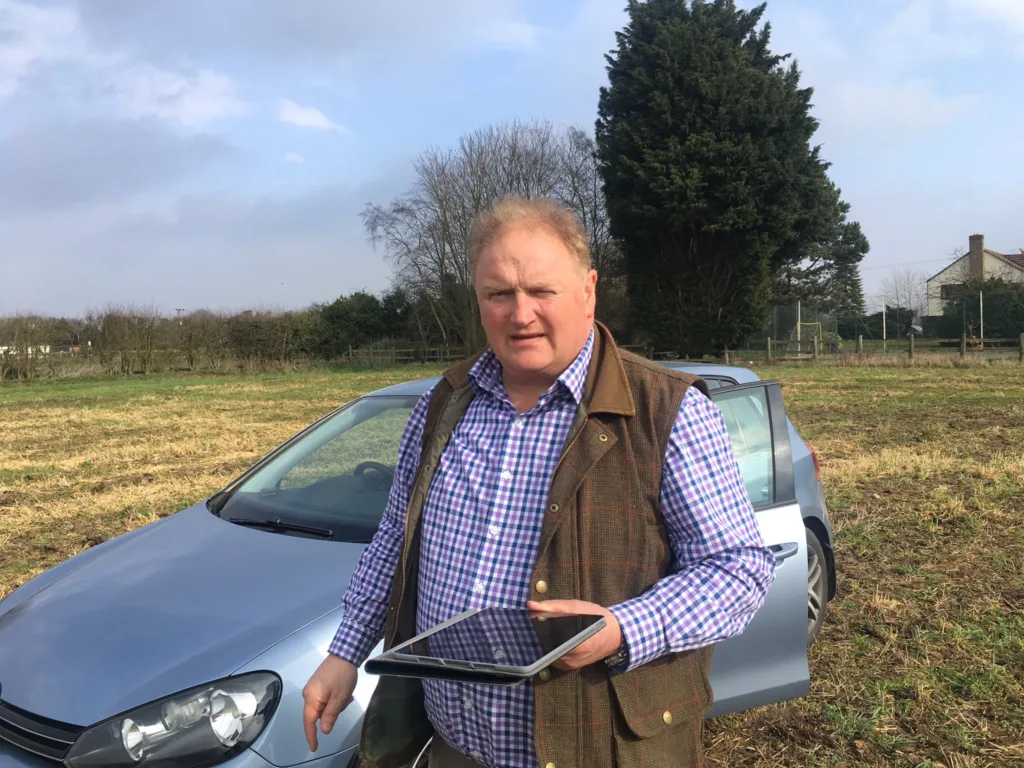
The letter pointed out that a clear majority of villagers had given it as “resounding thumbs down” as reported by Fenscene magazine who reported on a 2019 public meeting.
Villagers also pointed out that a survey in 2020 by the parish council showed that 75 per cent of those who responded with either opposed or strongly opposed to Camps Field.
“One 18 per cent of respondents supported the project,” argued the villagers. “There is simply no evidence of support for this proposal.”
That didn’t stop the parish clerk writing to the district council in May 2020 to state, succinctly, that “the councillors of Wilburton Parish Council discussed the application and are unanimously in favour of the application”.
Whilst many have taken that response with a pinch (well a handful) of salt, to return to the letter from villagers it opened up to public inspection preliminary simmering of the divide.
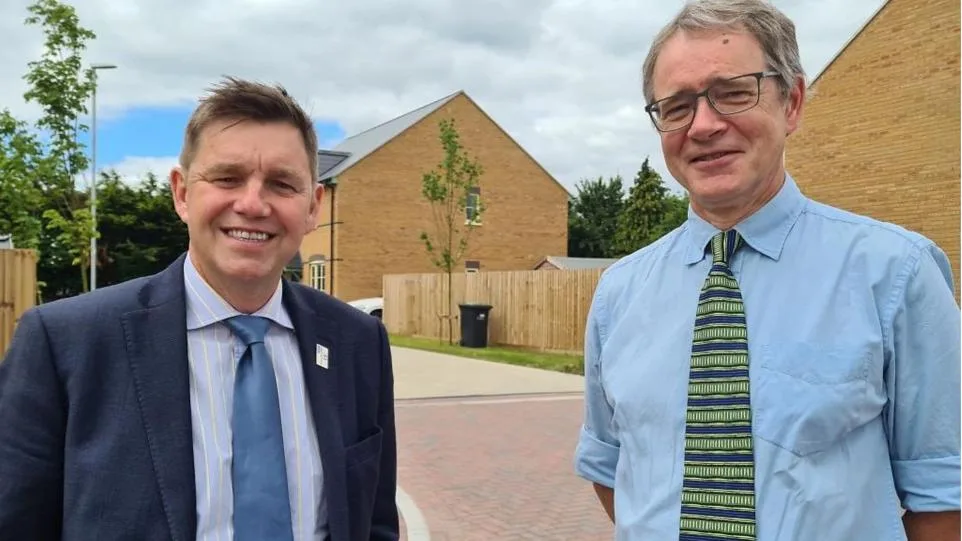
The letter, in querying why the planning application had been submitted on the day all schools were closed in England due to Covid, and with “everyone in our village naturally deeply anxious about the future of their families”, questioned why the SWCLT and Laragh Homes went ahead and submitted the planning application at the stage.
“And parts of this application have been, inexplicably, submitted on Combined Authority letter headed notepaper,” they observed.
It was the involvement of the Combined Authority with the application that became an early focus of incoming Mayor Dr Nik Johnson after his surprise defeat of James Palmer in May of 2021.
Dr Nik came to power with minimal insight and knowledge of the affairs of Wilburton and its CLT. That omission has since been rectified. Well, partially.
A year ago, ‘Save Wilburton from Over Development’ (a key trigger in the campaign to oppose Camps Field) was among those invited to help with a review of the CAPCA’s housing programme.
It was to have been led by Cllr Aidan Van de Weyer and a ‘scoping’ document was agreed by the CAPCA overview and scrutiny committee on July 25.

These, the committee was told, included ministerial letters sent to the Combined Authority “and these have not been fully scrutinised”.
Key lines of inquiry were set out and these included:
1: The process for establishing the partnership with Laragh Homes and the contractual arrangements put in place
2: The decision to establish a loan fund with part of the housing funding, including communications with central government.
3: The governance of loans to East Cambridgeshire District Council, East Cambs Trading Company, and Laragh Homes.
4: In particular, the decision to approve a loan after the start of the Covid pandemic.
5: The governance around the decision to support community land trusts.
6: The issuing of a statement of community benefit in relation to the Stretham and Wilburton Community Land Trust.
The committee was told that evidence required included correspondence between CAPCA and the government and correspondence between officers.
And the committee wanted to see all procurement and contract documents.
Noble aspirations but in the year that has since passed, little has been heard of the review although the background noise suggests sourcing essential documents – including correspondence – has been hampered by personnel changes at the Combined Authority.
What we can establish is the Combined Authority has withdrawn its broad-based document ‘statement of community benefit’ for the Camps Field development that was submitted on Combined Authority head notepaper and emblazoned with the imprimatur of Mayor James Palmer across it.
The CAPCA submitted Statement of Community Benefit concluded with the assertion that “not only have the local community been able to exert control over how the site comes forward, but they will also take a long-term ownership and stewardship role over all of the affordable homes, community assets, and open spaces that come forward.
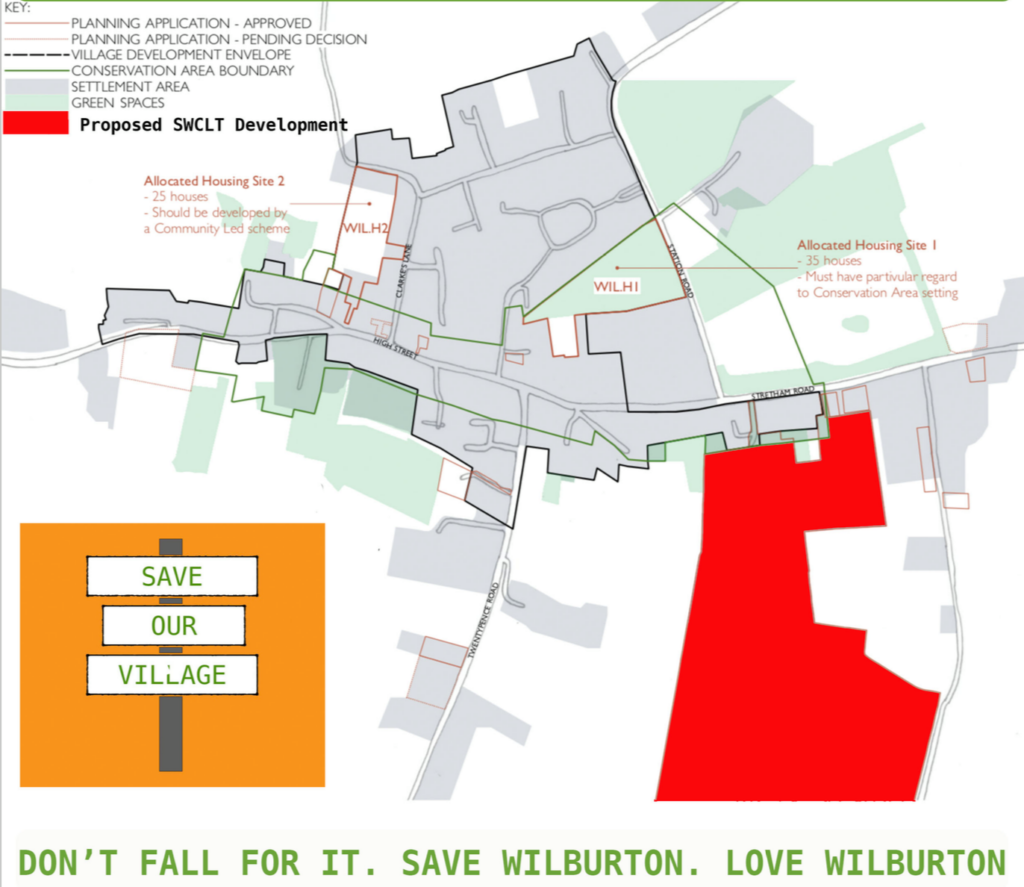
“This project will strengthen the local community and provide not only for the current community, but also future generations to come”.
Mayor Johnson was not convinced, and the document is no longer visible among the 300 documents the application has accumulated: you can draw your own conclusions.
A key figure in Camps Field has been Emily Mulvaney, who since September 2021 has been development manager for Laragh Homes.
Prior to that Emily had held a position at the Combined Authority overseeing community led housing and community land trusts and before that had worked for East Cambridgeshire District Council on their community team initiatives, including the Manor Farm, Stretham, scheme.
And it is Emily who, if not the author, would certainly have had oversight of the ‘statement of community benefit’ issued by the Combined Authority for Camps Field.
In theory, and in practice, community land trusts have served many parts of Cambridgeshire well, but East Cambridgeshire Council has taken them to a new level.
And it is that scale of ambition, including the rapid expansion for example of Manor Farm and the CLT ambitions for Kennett, that have led organisations such as Save Wilburton from Over Development, to counter, and if possible, thwart, the level of intrusion into their communities.
They set out that opposition in a strongly worded letter last year which, in part, prompted CAPCA to begin its investigation.
More than 40 residents of Wilburton, Stretham and Little Thetford, villages put their names to an open letter sent to a variety of interested parties that included MP Lucy Frazer, Mayor Johnson and Cllr Anna Bailey, leader of East Cambs Council.
“We are writing to you as a group of community members from rural villages within East Cambridgeshire who are extremely concerned about the practices and operations of Community Land Trusts (CLTs) in our villages particularly, but also in the wider district,” their letter began.
“Whilst CLTs are set up to be independent, the move to push CLT developments has been driven and promoted by East Cambridgeshire District Council (ECDC), their trading arm (ECTC) and with major policy changes that facilitate a development model which is unique to East Cambridgeshire.
“Our belief is that ECDC have sought to use CLTs as a profit driven development platform, with policies put in place enabling unrestricted development outside defined and publicly scrutinised planning envelope boundaries detailed in the Local Plan.
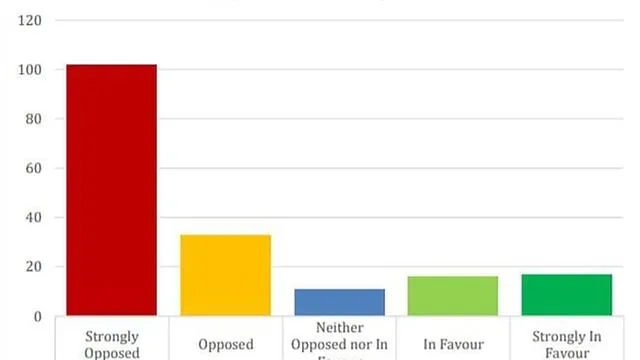
“Funded in part by money from the Combined Authority, plans have repeatedly been shown to be undemocratic, with opportunity for meaningful community leadership severely, or completely, curtailed.”
The letter continued: “We now believe that there is an urgent need for an investigation into the behaviour and governance of CLTs in our region, involving the auditors of both ECDC and DLUHC (The Department for Levelling Up, Housing and Communities).
“The practices of ECDC CLTs differ from those of the national CLT Network and have resulted in the weakening of democratic accountability as CLTs are governed solely by the most basic regulatory oversight.
“A small and dwindling CLT membership cannot be deemed representative of the local community, who in turn have little input to key decision making.
“Although claiming to bring forward ‘community led’ plans, the reality is that plans are presented to the community only after those key decisions have been made.”
It was strong and stirring stuff.
The group alleged queries have been met with misleading or incomplete statements and calls for village meetings ignored or refused.
They went onto claim that such an approach had proved to be hugely divisive and damaging “fracturing well established and long-standing community cohesion in the small rural villages of Wilburton, Stretham, and Little Thetford”.
They also felt the Government provided insufficient regulatory control of CLT and this had led to a scaling up of commercial activity in East Cambs with schemes passed on land not allocated in the Local Plan.
And crucially that “the CLT model in East Cambridgeshire has created market distortion, inasmuch as favoured developers gain privileged access to development opportunities.
“The 500-home flagship ECTC CLT development in the small village of Kennett has now been sold to Bellway Homes.
“Bellway’s purchase has secured for them a large housing project in open countryside which under normal circumstances would never have been given planning permission.
“According to ECDC policy, development in this area of the district should contribute 40% affordable housing, not the 30% that Bellway is now required to provide”.
The letter was lengthy, technical in places, but supportive of an inquiry into CLT projects past, present and to come in East Cambridgeshire.
In the meantime, the planning application for Camps Field awaits determination, and with county highways still discussing potential traffic issues at the A10 Stretham roundabout, a timescale is difficult to assess.
East Cambs Council will also be obliged to agree whether community consultations have met the threshold required under both its own and national guidelines.
Meanwhile the council’s planning officer, in the latest exchange of correspondence with agents for the applicants, have once again extended the timeline for determination “to allow formal re-consultation of received amended plans”.
Planners have provisionally targeted getting the application on the planning committee for July 5.
But the letter didn’t specify which year.

























